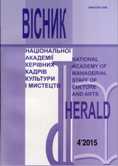НОВІ НАПРЯМИ В ТУРИЗМІ ЯК КУЛЬТУРНІ НАСЛІДКИ ГЛОБАЛІЗАЦІЇ
New trends in tourism as a cultural consequences of globalization
Author(s): Liubov BozhkoSubject(s): Cultural Anthropology / Ethnology, Tourism, Globalization
Published by: Національна академія керівних кадрів культури і мистецтв
Keywords: globalization; backpacking; backpacker; volunteer tourism; volunteer work; research;
Summary/Abstract: Forming of new global culture includes an infinite variety of meanings, ideas and values, also the appearance of a new lifestyle. Movements are becoming more ambitious and varied. To the old forms of mobility are added new ones, associated with the use of new forms of communication, information recipience and navigation. New mobility transforms the basic forms of world perception and practices. The new, hybrid forms of mobility are gradually assuming the character of routine, becoming the culture of everyday life. Tourism activity acquires new motivations: self-realization, design of representations of themselves, about the way of life and so on. In this regard, the topical are becoming questions, related to the study of new tour-ism practices that have emerged under the influence of modern globalization processes and are forming new identity. Special attention was paid to this issue in the modern Western studies of Z. Bauman, U. Beck, D. Bell, P. Berger.The purpose of the article is to trace the development of new forms of tourism that emerged under the influence of globalization.Attention, first of all, is paid to the history of development of backpacking and volunteering tourism. Is accented that the new forms of tourism testify that globalization is the most significant factor in creation and distribution of a new cultural identity.Backpacking − is an autonomous trip for little money. Main objective of backpackers is − to get acquainted with the culture of the place where they were in this time. According to research made by the World Youth Student and Educational Tourism Confederation (WYSETC), more than half of residents of western countries aged 18 to 34 years have traveled the world. Only a fifth of them traveled with the tourist voucher and 80% paved the way without assistance by booking flights online, organizing accommodation and transport in place. Due to the continuing increase in number of long-term budget travelers all over the world and necessity of study this segment of the tourism market, at a conference, held by the Association of Educational Tourism and Recreation (ATLAS), was created a group "Backpacker Research Group" (BRG) also was developed a research program. Research work carried out in the western countries have shown the complexity of this phenomenon and raised many issues that require further study. First of all, research suggests that today's young travelers identify themselves as "independent travelers" or "backpackers" more often than as "tourists". Besides the main motive − studying other cultures − studies have shown a wide spectrum of personal ambitions when making the trip, including a desire to be part of the multimillion international community of young travelers on the road.Speaking about Ukraine and Russia, the backpacking is still in its infancy. Under it we mean, exactly, journeys outside the country (internal nomads usually called "hikers", "kayakers", "miners", etc.). The founder of Russian back-packing is called traveler V.A. Shanin. He actively promotes the ideas of backpacking in Russia and has even created several websites on this subject. In the last decade interest in backpacking increased, and as a result, began to appearspecialized websites, where independent travelers can discuss future or past trips, share experiences, learn about seminars and meetings.In the last years backpacking ceased to be only the youth fashion − now to distant lands with a backpack on their shoulders also trip non-poor people − flashpackers. Another popular form and alternative to mass tourism became volunteer tourism (Voluntourism), initiated in France in 1920, where was implemented the first volunteer project, to restore the territory, destroyed by the First World War. Today all global international institutions such as the UN and UNESCO have volunteer departments. Volunteers are involved in projects of health care (vaccinations, fighting HIV, tuberculosis, other infections), they eliminate hunger, illiteracy, take part in the evacuation of the wounded, the sick, children and women from hotbeds of armed conflicts and natural disasters, protecting equal rights of all sectors of the population, protect the environment and so on.Growth of volunteer tourism market has attracted the attention of scientists from different fields of science. In some scientific works volunteer tourism is described as a reliable way to travel, other authors are doubt its effectiveness, primarily as a factor that contributes to the sustainable development of society. Appear researches in sphere of perception towards the community of volunteer tourists. Most of sociological research devoted to individuality of tourists and the role played by tourism in establishing individual identity and consciousness of tourist. As a result of scientific research, the concept of volunteer tourism has become increasingly conceptualized, and we begin to understand what drives volunteer tourists, and what their influence on community.Thus, considered new forms of tourism testify that globalization is probably the most significant factor in the creation and distribution of a new cultural identity. We can note that backpacking and volunteer tourism provide an opportunity to search a new experience that goes beyond of what is offered in mass tourism. And this experience is seen as more significant for representatives of different cultural traditions.Research in the field of backpacking and volunteer tourism helps to understand better the benefits of these types of tourism in the community. Further studies of different types of tourism are necessary in order for understand if they can be attributed to the forms of social integration and consider factors of development sustainable tourism.
Journal: Вісник Національної академії керівних кадрів культури і мистецтв
- Issue Year: 2015
- Issue No: 4
- Page Range: 3-9
- Page Count: 7
- Language: Ukrainian

